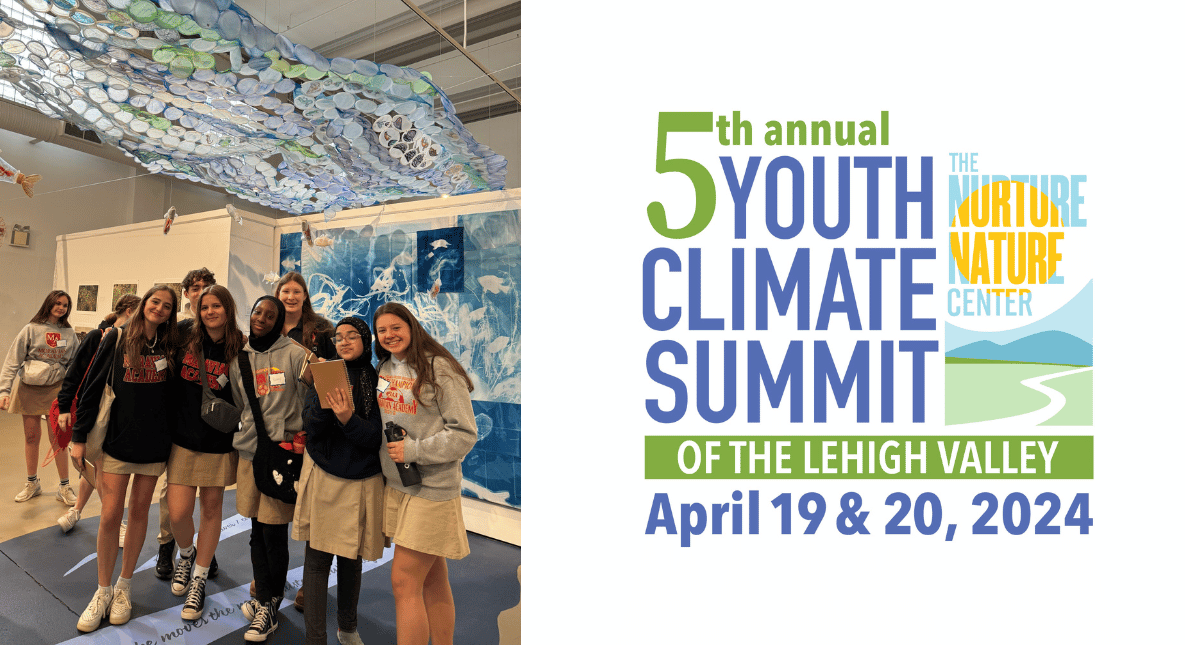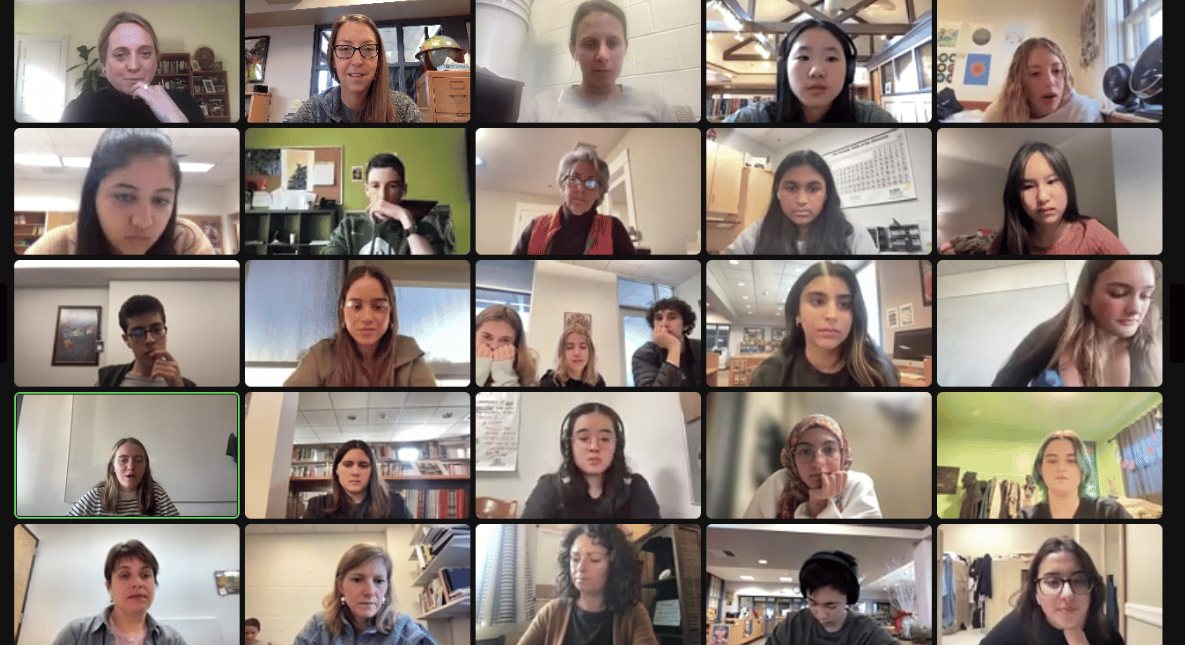Green Team Publishes Op-Ed on Single-Use Plastics
Members of our Upper School's Green Team (Grace Burcaw '22, Angela Chen '21, Sophia Cunningham '21, Audrey Dai '21, Lily Eyvazzadeh '22, Deirdre Hoffman '21, Maclaine Oskin '21, Sophie Reynolds '21, and Eli Zemsky '23) were recently published on The Bethlehem Gadfly, a Lehigh Valley community blog.
The op-ed, which explores how Bethlehem could limit the use of single-use plastic and pollution waste, was generated as part of Touchstone Theatre’s Festival UnBound’s Sustainability Forum.
States the Green Team:
One issue that is prevalent in our community is single-use plastic pollution and waste, especially surrounding grocery store policies relating to food preservation. Our perspective on the issue is that our community could do a better job of cutting down on plastic use. This would help the environment by limiting the exposure to pollution from the plastic itself and the chemicals used in or on plastic. Is it possible to completely stop using plastic? In today’s world, maybe not, but it is not only possible but plausible to limit the use of plastic and to use more ecologically friendly options whenever possible. Imagine walking into a grocery store and going to the produce section to get some fruit. When you get there, there is plastic everywhere. Plastic bags to hold the fruit, prepackaged vegetables wrapped in plastic, even bundles of bananas held together by and wrapped in plastic. Why is so much plastic packaging necessary in our grocery stores when nature has already provided a natural package? There are such excessive uses of plastic in our community as wrapping bananas together even though they already have peels, unpeeling an orange and packaging it in plastic, or giving out single-use plastic bags in which to carry produce. These can contribute significantly to plastic pollution that can severely harm our environment.
In order to cut down on our community’s plastic use, grocery stores could provide more environmentally friendly options. These options could include having giveaways of free reusable bags for store members, charging extra for using a plastic bag (something that is already done in some places in the U.S.), using paper bags at the checkout instead, having recycling centers in the store for used plastic bags, and giving customers who bring in their own bags or pre-approved containers a small discount from their purchase. U.S. Senator Tom Udall and U.S. Representative Alan Lowenthal are both members of our government that have been pushing for legislation that addresses our country’s plastic pollution problems, specifically in relation to marine, waterway, and landscape pollution. Also, organizations like the Plastic Pollution Coalition seek to end plastic pollution through education of the public and encouragement of people to be more aware of their plastic consumer consumption as well as to encourage eateries worldwide to end their use of single-use plastics. The Bethlehem Environmental Advisory Council also submitted a proposal to the City Council in February of 2019 asking the city of Bethlehem to place a ban on all single-use plastic bags and to enforce a ten-cent fee on paper bags.
One reason plastic pollution has become a big problem is because it poses a chemical danger to our environment. When plastic bags are left undisposed of in waterways like rivers, streams, or the ocean, they can leach toxic chemicals into the water and soil and damage surrounding plants and animals, affecting whole ecosystems and the water we drink. Additionally, in marine environments specifically, the plastic in our water can release odors that mimic those of some species’ food. This draws wildlife towards pollution and can cause entanglement and consumption, killing the animals. The microplastics consumed by organisms at the bottom of the food chain accumulate all the way to the top, resulting in our personal consumption of about 120-140 plastic particles a day.
A resolution to the plastic pollution problem requires action from all levels of our community from personal to corporate. We each must take personal responsibility for our contribution towards plastic use and consumption. By being increasingly aware of what we are purchasing and decreasing our use of single-use plastics by using reusable bags, jars, or containers, we can hope to reduce overall single-use plastic waste. We can also reduce our plastic use by buying from local and small business establishments to avoid large-scale plastic use from the shipping and packaging industries. Individuals can also use reusable water bottles instead of plastic ones.
On a business level, it is necessary to create anti-plastic policies to reinforce the benefits of sustainable action. In grocery stores, deterrents should be implemented against the use of plastic by utilizing a baseline monetary penalty for the use of plastic bags. To reduce plastic use, grocery stores can also invest in bulk food sections where the consumer can bring reusable containers or bags to get what they need. This method of purchase also decreases food waste since consumers only take what they need because the price would be based on weight and not what is cheaper, whether it be more than they need or not. Additionally, we believe that grocery stores should advertise and promote proper recycling and anti-food waste practices to the wider community. For example, stores should encourage the use of plastic bag recycling programs to which most people already have access by providing information about their locations, purposes, and benefits. At restaurants an effort should be made to not offer plastic straws or to, instead, offer a biodegradable or reusable option such as paper or metal straws. Restaurants can also replace styrofoam or plastic take-out containers with biodegradable containers.
Not only are personal responsibility and improved corporate policies necessary to reach a true solution but so is reaching out to our local legislatures and such government officials as Pennsylvania Senators Pat Toomey and Bob Casey, Jr., to implement laws to protect our environment, health, and natural resources. We must appeal to local governmental bodies like the Bethlehem Environmental Advisory Council to promote and to continue to protect the environment with legislation like their single plastic reducing ordinance created by the Waste Reduction Task Force. It all starts with voting for those who endorse environmental policies and limiting our plastic production or use.


 myMA
myMA











